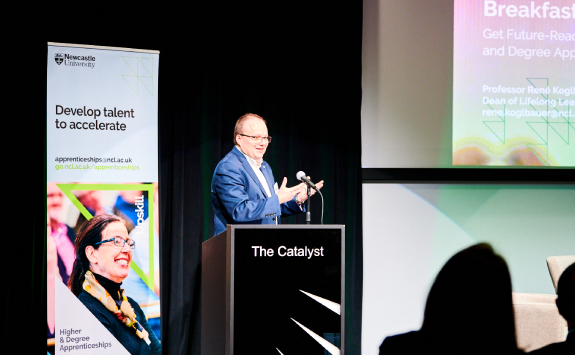The face of UK industry is changing rapidly, not only in response to critical issues like Net Zero and the digital revolution, but also as a direct result of advances in technology and manufacturing, thanks to our excellence in R&D and innovation.
It's a transition that has the potential to create jobs and prosperity, particularly here in the North East, but if we are to take advantage of these opportunities we urgently need to work to address the skills shortage so as to serve the UK's future needs.
Increasingly, the Government is looking to universities to provide courses that develop learners' specific technical skills, such as HTQs (Higher Technical Qualifications) and degree apprenticeships, that meet employers' demands and equip apprentices with the required technical and transferrable skills.
Skills for Life
We’re leading a new institute to support training and skills development in the field of Power Electronics, Machines and Drives (PEMD). The Institute of Electrification and Sustainable Advanced Manufacturing (IESAM) is the first to address industry needs by developing a flexible, high-quality PEMD training pipeline in the North East. IESAM is a consortium of FE and HE providers across the North East that provides a coordinated 'front door' for PEMD training, working in collaboration with industry partners.
We are also developing upskilling courses for FE lecturers in Green Drives (focusing on Battery technology) and green power.
Through our work with the Lifelong Education Commission, the University has become a key stakeholder for the Department for Education. I am hoping to utilise this to influence future policy on skills provision.

In partnership
With colleagues from FE colleges, including NCG and Education Partnership North East (EPNE), we've recently briefed Shadow Universities Minister Matt Western and Toby Perkins, Shadow Skills Minister.
Furthermore, I have acted frequently as a key stakeholder for the Lifelong Loan Entitlement Team at the Department for Education. We are working with civil servants to assess the feasibility of implementation of their policy proposals.
Katie Wray, Associate Dean of Lifelong Learning and Skills in the SAgE Faculty, and I are representing the University at the provider meetings of the Local Skills Improvement Plans (LSIPS), contributing to a report on skills and the role of regional education partnerships. These regional plans will direct future investment into skills and adult education and partnerships between the regional education players are key to this.

These plans are shaping up and align closely to the priority areas we have set ourselves in the skills agenda:
- Net Zero & electrification
- Digital
- Health & life sciences
- Leadership & management
As part of our Newcastle Universities Agreement, in partnership with Northumbria University, NCG and EPNE, we are mapping our skills offer in health and social care and working with regional and national stakeholders to identify not only areas of expertise but also potential gaps in our regional health and social care education and training offer.
Professor René Koglbauer is Dean of Lifelong Learning and Professional Practice at Newcastle University.
We are urging the Government to further encourage employers to work in partnership with universities in offering higher and degree level apprenticeships
Professor René Koglbauer Dean of Lifelong Learning and Professional Practice at Newcastle University

